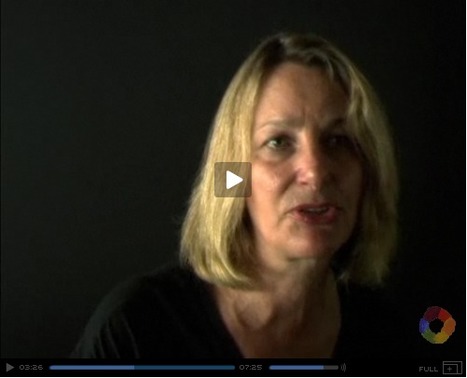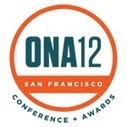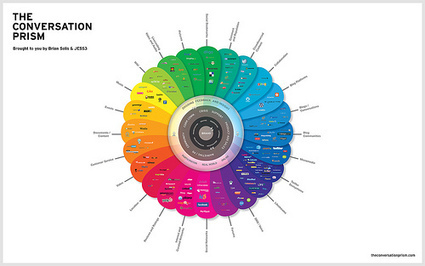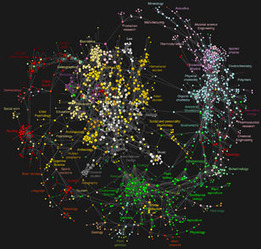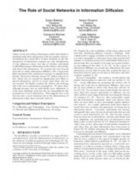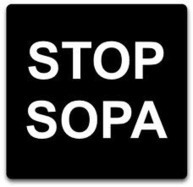In 2012, social networks are proving to be the main channel of expression for internet users. In the age of social media and the mobile web, the internet is entering...
Get Started for FREE
Sign up with Facebook Sign up with X
I don't have a Facebook or a X account

 Your new post is loading... Your new post is loading...
 Your new post is loading... Your new post is loading...
Yesterday, Maria Popova (@brainpicker), one of the Web's prominent curators proposed the idea of a curator code. Via Guillaume Decugis 
Robin Good's comment,
March 11, 2012 5:24 AM
Hello Guillaume, as I wrote in my short piece about Curator's Code, you and Maria should get together and see if there is a simple way to make the two bookmarklets work together, as for now they don't. Have you tried?

Guillaume Decugis's comment,
March 11, 2012 9:48 AM
Hi Robin. I just talked to her yesterday on that matter in Austin. We're going to have a look at it. Keep you posted!
Much of Buddhist philosophy centers around this same idea, this balance between what’s being phrased as “intention” and “attention” – our intentional curiosity about knowledge and growth, and our choice of where to focus our awareness, what to pay attention to. So that, I think, is the role of information curators: They are our curiosity sherpas, who lead us to things we didn’t know we were interested in until we, well, until we are. Until we pay attention to them — because someone whose taste and opinion we trust points us to them, and we integrate them with our existing pool of resources, and they become a part of our networked knowledge and another LEGO piece in our combinatorial creativity. So if information discovery plays such a central role in how we fuel our creativity and thus in our creative output, then information discovery is a form of creative labor in and of itself.
An absolute must read, from Maria Popova, master curator. Curation is not only a necessity to make sense of the web, it is the path to explore your own creativity :
How we choose to pay attention, and relate to information and each other shapes who we become, shapes our creative destiny
Truly inspiring. Via axelletess
We've suggested this topic for a panel or a talk at the next Online News Association conference.
As we see the Publishing and Tech worlds overlap more and more, an interesting way to look at the future of Media is to take an engineering angle. You'll find a summary below and by clicking to the Reddit page of the ONA, you'll be able to vote and comment.
"The Web has killed the integrated newspaper model where the same company did everything from writing to publishing and from editing to distribution. To survive in the open internet, media companies need to become platforms that interoperate with others, forming what engineers call stacks when they build something on top of another. One of the stacks that seems obvious in that model is the sharing stack, whether you call it Facebook or Twitter. With the exploding growth of platforms like Tumblr or Pinterest, we're also discovering the importance of a new layer: the curation stack, which as it democratizes, can make everyone a publisher. Are journalists, the historical news curators, ready to embrace that change?" Via Guillaume Decugis
"Intel is funding a global events and artist showcase: The Creators Project. Can avant-garde artists help it it sell more microprocessors?"
Tom Foremski - who's been watching curation as a trend for quite some time and who also started the SF Curators salon, a group where we contribute - reports on an interesting initiative by Intel to use curation to support its brand. Interesting read. Via Guillaume Decugis
A must read from Steve Rosenbaum.
We know the amazing contribution of Steve on this topic (we had the chance to interview Steve at SxSW this year). He explains here very clearly why curation creates value for a corporate organization such as IBM, not only for its customers, but internally.
Via axelletess
The College has recently completed the full implementation of its 1 to 1 program across all year levels. The focus has now shifted to utilising this environment to full effect ... Via Kim Flintoff
First, let’s just get clear on the terminology here: “Curation” is an act performed by people with PhDs in art history; the business in which we’re all engaged when we’re tossing links around on the internet is simple “sharing.” And some of us are very good at that! Via Kim Flintoff
From
vimeo
This is the first in a series of videos explaining the shifts we're seeing in the world of content creation. Curation has exploded with the growth of Twitter, Tumblr and now Pinterest. Via Kim Flintoff
The activity I’ve just described, that Hans and I were engaged in for our organisations, is digital curation. Us education technologists have probably been acting as digital curators for our organisations around the e-learning and education technology topics for longer than we realise. If you’re an edtech who recognises this, I would love to hear your experiences and thoughts. (JS) Via catspyjamasnz, Kim Flintoff
Scholarship 2.0 is devoted to describing and documenting the forms, facets, and features of alternative Web-based scholarly publishing philosophies and practices. The variety of old and new metrics available for assessing the impact, significance, and value of Web-based scholarship is of particular interest. Via Kim Flintoff
Most people have neither the time nor the stamina to wade through miles of information looking for the narrow range of content they're interested in. By sifting through fields of haystacks in search of a couple of needles, curators provide a valuable and powerful service. But don't confuse curation with aggregation.
<- lots of good quotes and thinking in this article. a step up from the usual curation articles. (JS) Via catspyjamasnz, Kim Flintoff
All about digital curation for 21st century media...
<- great starting point (JS) Via catspyjamasnz, Kim Flintoff |
The purpose of watching news on TV has always been to be informed, to better know the world you live in and stay connected with whatever is going on.
This is an interesting analysis on the Atlantic on the Curator Code that Maria Popova introduced last week. Via Guillaume Decugis
Arabella Santiago is the founder of Startup Live and the Executive Director of the TechWeek conference in Chicago where I'm speaking in a few months. We had a discussion on the role of curation as an expression form in Austin at SxSWi a few weeks ago and we also touched upon the topic of the coming TechWeek session which is about the trend of remixing content to create something new: "No one wants to be duplicating content, but if you quote content and you put content in context then you can create something which has higher value than the original.
It's something we have gotten used to in Music with DJ's and rappers sampling and remixing songs but that the Web makes possible for everyone to do with any form of content. Having been a music entrepreneur before, I like this analogy and I think it shows quite well how a whole creativity potential can be unleashed by new tools and platforms. Via Guillaume Decugis
This is a great interview of David Carr, the well-known columnist at the New York Times where he publishes "The Media Equation" on the future of Media and Journalism. It was suggested to me by Serge van Oudenhove: thanks!
Carr was a speaker at a recent SxSWi pannel named the Curators and the Curated and he comes back in this interview on his "yes, but" about curation: yes, he believes content curators have an important role to play, quoting Maria Popova who was at that same pannel, but also pointing out the importance of attribution and credits, a "form of compensation" in the sometimes too free-for-all Web.
But his interview takes a step back looking at the future of publishing, including the business model challenges in the digital age.
He gives interesting persepctives making it a great read. Via Guillaume Decugis
"Over the last couple of years, I’ve come to think of my role as a teacher as that of a curator of ideas" says Corinne Weisgerber who teaches Social Media and Communication at St Edwards Unniversity in Austin, TX (if you haven't yet, check out her...
We’ve been hearing (and talking) a lot about curation and how helpful it can be. This article will give you a clear idea about curation with scoop.it. For those who already believe, and also for non-believers! Via Kim Flintoff
this research done by Facebook in collaboration with the university of Michigan finds some surprising things about the information propagation power of strong ties versus weak ties (JS) Via catspyjamasnz, Kim Flintoff
Just this weekend I’ve finished writing a lead article for my SLANZA friends in NZ for their Collected Magazine. School librarians everywhere are interested in the same things, so I was pleas... Via Kim Flintoff
A stream of ideas, cartoons, unrefined sketches, marginalia about curation at #sxswcurate
<- inspirational stuff (JS) Via catspyjamasnz, Kim Flintoff
curation is fundamentally a content-friendly act. This literally means caring about content: caring enough to highlight it, promote it, share it and make other people want to enjoy it as well. This has always happened but historically, this was something done by a minority – a few gatekeepers. In such a model, a few decided what content we were going to consume. But what we’ve seen with Web 2.0 is that we could have a different model with many sharing content to many. As curators multiply and everyone becomes a publisher, we can all see the benefits through the diversity of opinions being expressed, the long-tail of niche topics being covered or the variety of content being discovered.
<- Scoop.it blog highlights role of curators. Real danger is of course that curation also means amplification, and amplification means higher visibility of potentially law infringing materials. And that leaves sites like scoop.it, Pinterest and Delicious open to law suits and potential shutdown.
One comment they make and Clay Shirky also makes is that the shift of burden of proof under SOPA/PIPA would move away from the "right owners" under DMCA. And I think that is where legislation should be looking... What is this "right"? And is this "right" still sensible in a world that is so different from the world in which patent and copyright was invented? (JS) Via catspyjamasnz, Kim Flintoff
Web 2.0 provides ways to filter, streamline, organise, share, distribute or gather information from the burgeoning information jungle.
<- Great presentation from Judy describing curation practices even if the actual term is only mentioned briefly... (JS) Via catspyjamasnz, Kim Flintoff |





